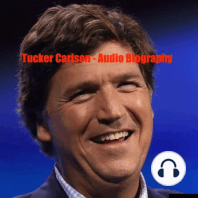3 min listen
Post Putin Interview fallout
ratings:
Length:
4 minutes
Released:
Feb 14, 2024
Format:
Podcast episode
Description
Tucker Carlson's Interview with Putin: Beyond the Headlines On April 21st, 2022, the American landscape shifted as Fox News host Tucker Carlson sat down with Russian President Vladimir Putin for an exclusive interview. This meeting, amidst the escalating war in Ukraine, sparked a firestorm of reactions, dividing audiences and igniting heated debates. While some saw it as a crucial opportunity for direct dialogue, others denounced it as a platform for propaganda and appeasement. Delving deeper into the interview, several key aspects became focal points:Framing the War: Putin reiterated his narrative of a "special military operation" solely focused on demilitarization and "de-Nazification," deflecting any responsibility for the devastating humanitarian crisis. Carlson, while questioning the use of the term "de-Nazification," largely avoided pressing Putin on the validity of these claims. This framing sparked criticism, with some accusing Carlson of legitimizing Russian propaganda.Accusations and Defenses: Putin launched into familiar critiques of Western interference, particularly pointing towards US support for Ukraine's Azov Battalion, a far-right group. Carlson, however, did not delve into the complexities of the Azov Battalion or challenge Putin's portrayal of US involvement. This lack of confrontation left viewers questioning whether Putin's narrative remained unchallenged.Authoritarianism and Democracy: When questioned about his leadership style, Putin defended his democratic credentials, highlighting his electoral victories. Carlson, instead of exploring criticisms of Russia's limited political freedoms, opted to engage in a "whataboutism" tactic, citing American political issues. This approach further blurred the lines between legitimate government and autocratic rule.Seeking Harmony vs. Maintaining Distance: Putin expressed a desire for positive relations with the US, conditional upon ending interference. Carlson, throughout the interview, seemed receptive to this message, sparking concerns about potentially overlooking Russia's aggression in favor of dialogue.Beyond the immediate exchange, the interview's long-term implications raise concerns:Amplifying Narratives: Putin's justifications for the war gained exposure on a major American platform, potentially influencing viewers' perceptions of the conflict. This raises concerns about the normalization of misinformation and propaganda.Undermining Ukrainian Authority: The limited space given to Ukrainian perspectives, alongside Putin's unchallenged claims, risked diminishing Ukraine's agency and narrative in the international arena.Dividing American Opinion: The interview further polarized American views on the war and Russia, potentially hindering national unity and coordinated responses.Ultimately, the full impact of Carlson's interview with Putin remains to be seen. However, it undeniably ignited crucial discussions about media responsibility, information warfare, and the delicate balance between dialogue and accountability in the face of international conflict. This retelling serves as a starting point for deeper exploration, encouraging you to critically analyze the interview, its context, and its lasting effects. Was it a necessary exchange or a missed opportunity? Did it foster understanding or contribute to existing divides? As you delve into these questions, remember the importance of seeking diverse perspectives and engaging in informed discourse within the complex realities of our globalized world. Thanks for listening to Quiet Please. Remember to like and share wherever you get your podcasts. And Hey! History buffs, buckle up! Talking Time Machine isn't your dusty textbook lecture. It's where cutting-edge AI throws wild interview parties with history's iconic figures. In the Talking Time Machine podcast: History Gets a High-Tech Twist, Imagine: Napoleon Bonaparte talking French Politics with Louis the 14th! This podcast is futuristically insightful. Our AI host
Released:
Feb 14, 2024
Format:
Podcast episode
Titles in the series (12)
Tucker Carlson - Audio Biography: Tucker Carlson: A Controversial Figure in the Landscape of American News Tucker Carlson, the name synonymous with provocative political commentary and high ratings, is a complex figure defying easy categorization. He's a conservative broadcaster, a... by Tucker Carlson - Audio Biography
